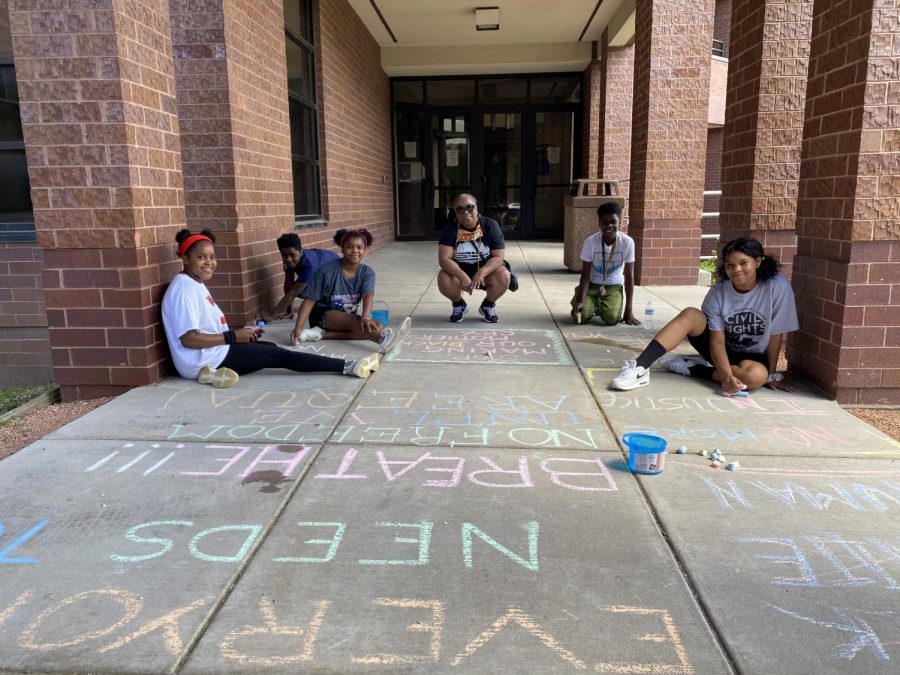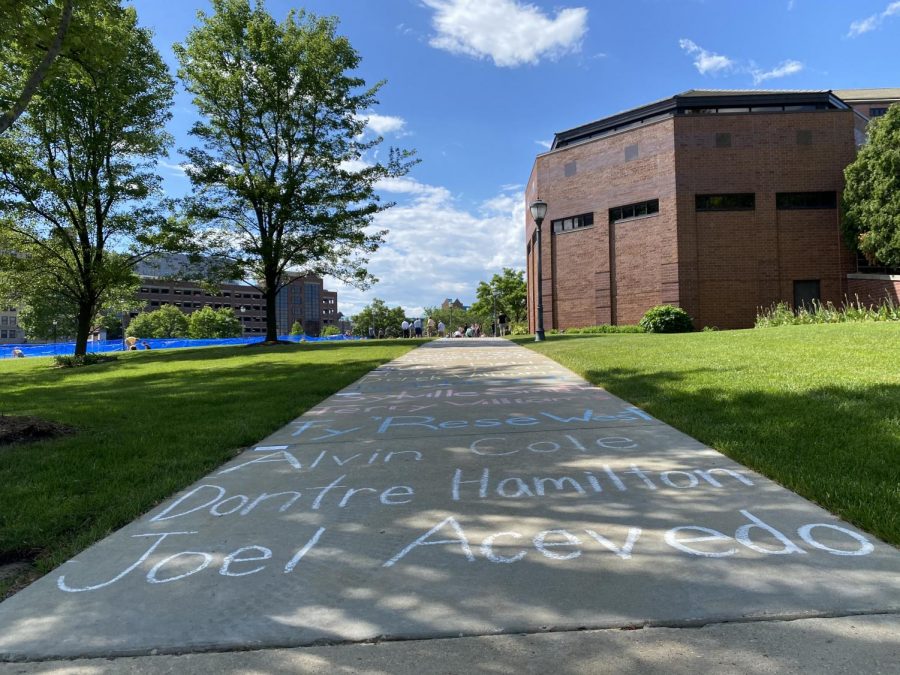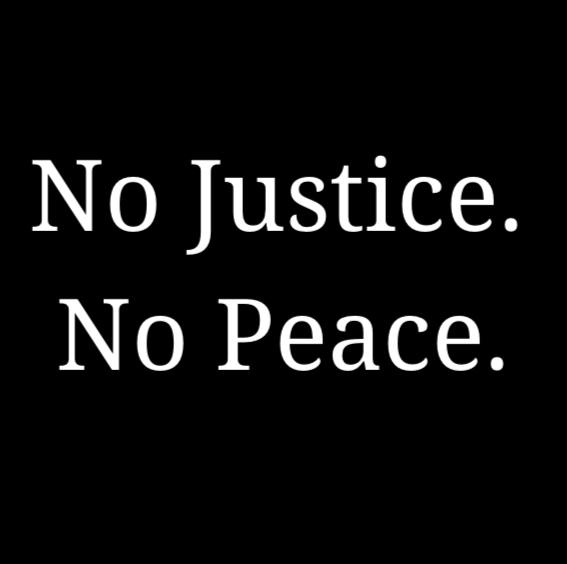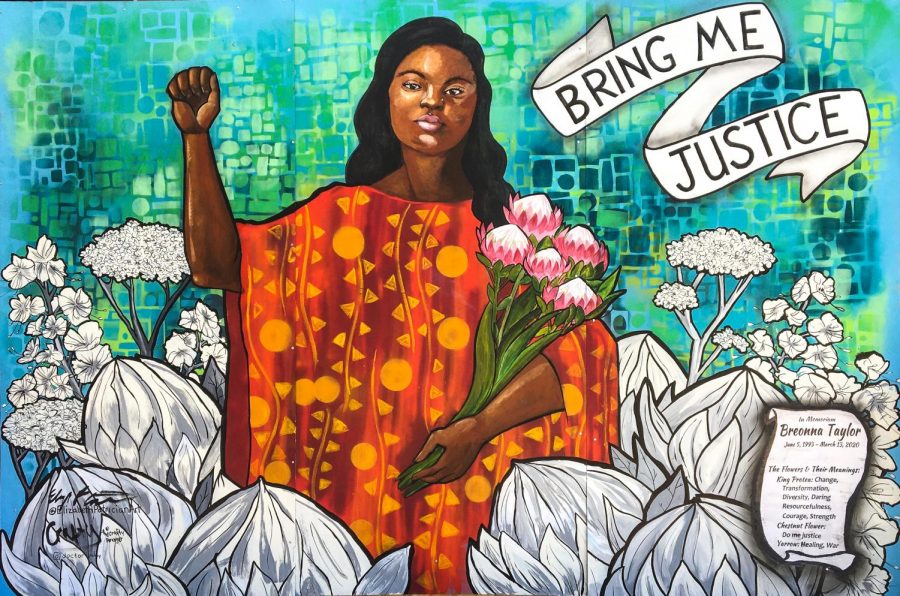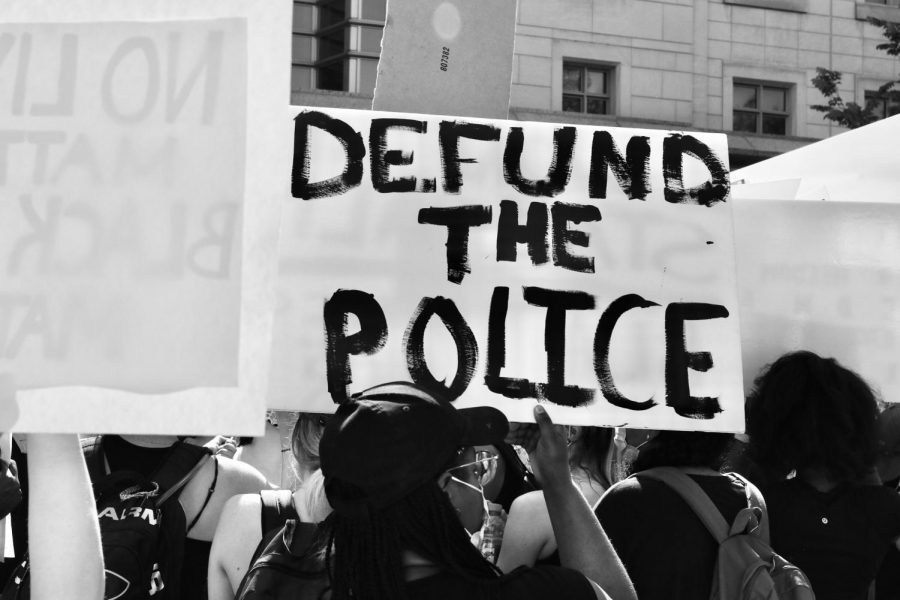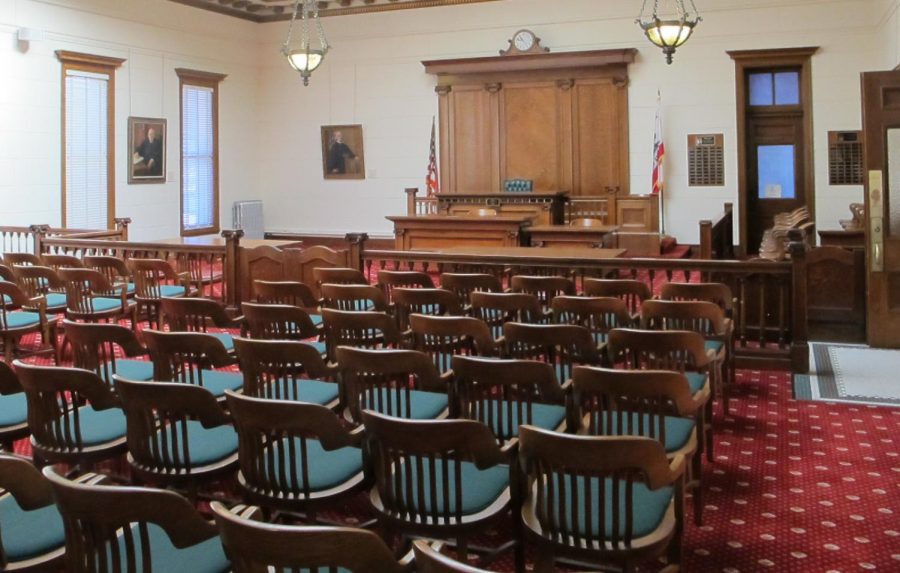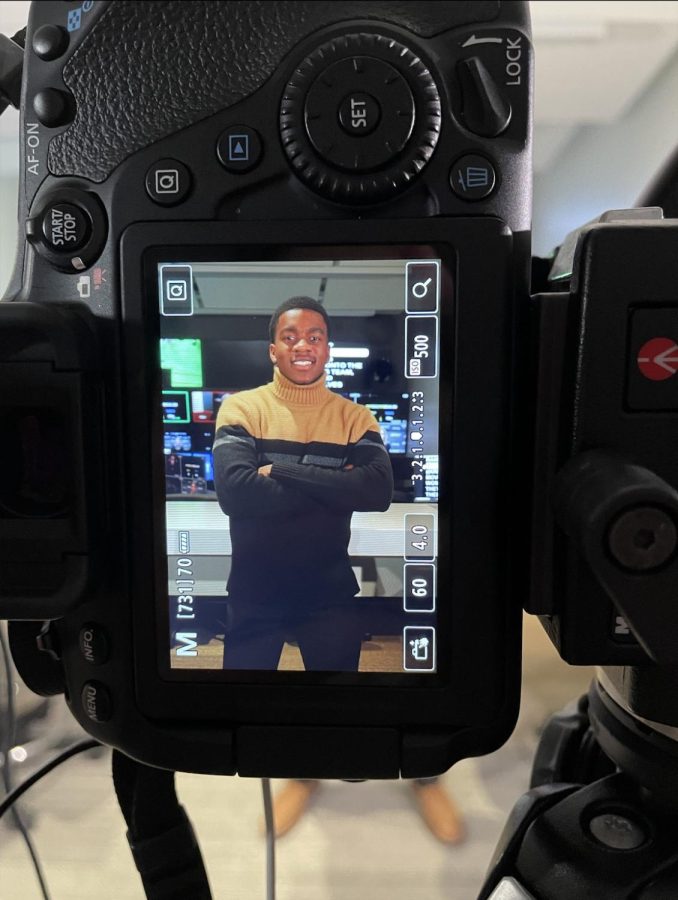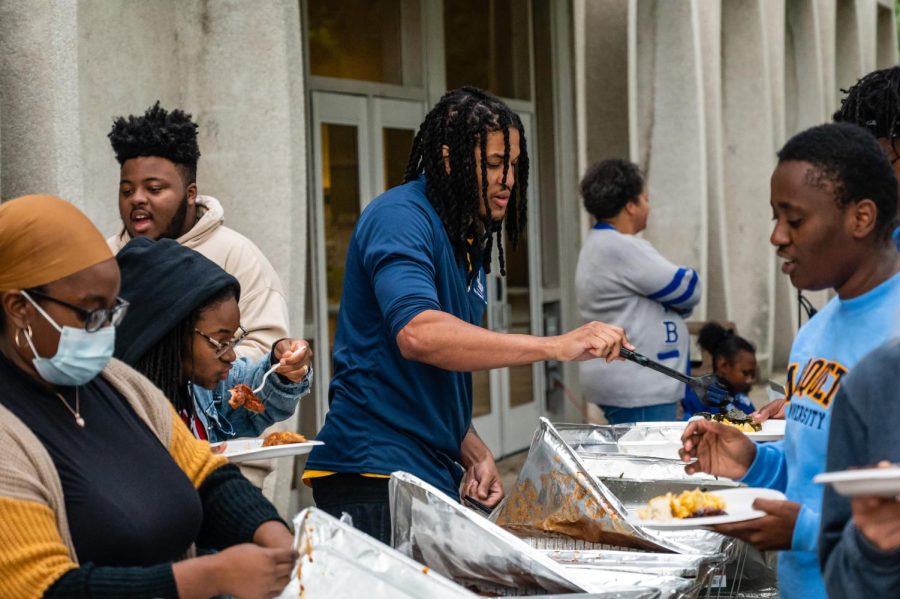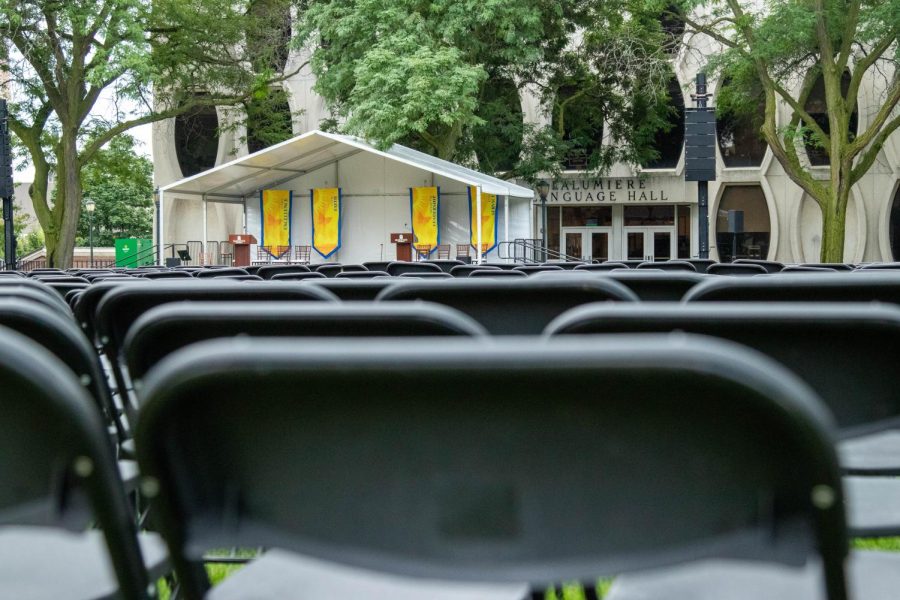Marquette University community members decorated the pavement outside the Alumni Memorial Union in West Town Square with chalk art Thursday afternoon. The pavement was not just a result of summer fun, but rather filled with messages supporting the Black Lives Matter movement, calling out racism and remembering individuals who have fallen victim to police violence.
Titled Mark Up Marquette, the event was organized by Marquette students and held Thursday from 3 to 5 p.m. It was open to the public and advertised on Facebook.
Aryana Barudin, a 2020 Marquette alum and one of the event’s leaders, said Mark Up Marquette was organized as a family-friendly event to be a safe, socially-distant opportunity for community members of all ages and abilities to take part in the Black Lives Matter movement.
Cities across the United States have broken out into protests and calls for defunding and reform of police departments following the May 25 killing of George Floyd by a Minneapolis police officer.
The event’s student organizers mapped out a general plan for the pavement and encouraged attendees to take part in any way they wanted. Across the center sidewalks were the words “Black Lives Matter” and “White Silence is Violence.” On the sidewalks leading from Wisconsin Avenue to West Town Square, 156 names of black individuals killed by police violence were listed, three to a square. On the remaining empty pavement, attendees were welcome to draw or write whatever they wished. Since Mark Up Marquette was advertised as a child-friendly event and the organizers informed the university of their plans, the only rule was to not use expletives in chalk drawings.
About an hour into the event, speakers addressed the crowd of volunteers, thanking them and reminding them about the purpose of community work. The speakers were Barudin; Eric Burks, a senior in the College of Communication; Lazabia Jackson, a junior in the College of Communication and Black Student Council vice president; and Breanna Flowers, a senior in the College of Arts & Sciences and Black Student Council president.
The speakers addressed the importance of working to eliminate racism in all aspects of life, particularly education. As students of color, the speakers touched on their own experiences and the experiences of others at Marquette, a predominantly white institution. According to Marquette’s Office of Institutional Research and Analysis, in fall 2019, 68.4% of the population of enrolled undergraduate students at Marquette was white, while just 3.9% was black.
“We’ve constantly been in a fight on this campus where every day it feels like you got to throw away your culture. Where every day it feels like you got to throw away everything that you came from,” Jackson said. “And why is that? Like, culture, being from a different culture is supposed to be beautiful. We’re supposed to embrace it.”
Flowers said she and Black Student Council have interacted with young black children and teens in Milwaukee. She said the kids they talk to are often astonished that Marquette is an option for them. However, Flowers said deep down she does not want to encourage them to come to Marquette, because it is not a welcoming environment to black students.
“But that’s not really how the economic system is set up for us right now,” Flowers said. “So we have to come to these places and we have to kind of fit into this culture. And I’m tired of it.”
Mark Up Marquette was initially planned by Julia McNeil, a senior in the College of Arts & Sciences. McNeil said she got the idea for the chalk event after seeing the success of the similar chalking event at the Milwaukee Art Museum on Sunday.
McNeil said she reached out to Stephanie Quade, the dean of students, to inquire if the group would get in trouble for chalking on campus property. The university agreed to allow the event and McNeil said Quade informed the Marquette University Police Department about the event.
McNeil said she wanted to ensure people of color were the most prominent voices at the event and reached out to Barudin, who in turn reached out to Burks.
Among those in attendance was University President Michael Lovell.
Lovell said he heard about Mark Up Marquette through Facebook and additionally marched in a protest over the weekend.
“I feel very inspired by this movement that is happening and I’m very excited to see something that’s happening right on our campus,” Lovell said. “I think this is a very unique way to actually help build a unity amongst everyone.”
Lovell said he encourages members of the Marquette community to join the university’s virtual town hall forum focused on racial justice this Wednesday, June 17.
While Lovell and the university publicly showed their support for Mark Up Marquette, Flowers and members of Black Student Council called for the university to take larger actions addressing racial injustices, particularly in education.
“College as an institution was not built for black people, in general,” Flowers said. ‘That’s why we have historically black universities and colleges.” Flowers said Marquette should exercise a strict zero-tolerance policy towards racism and additionally provide support and resources for black students on campus.
“We just need more help. We need them to care. It doesn’t seem like they care until we make it a problem,” Flowers said. “They show up to this event. Why could they not have started this themselves? Why could they not have had their own (event) against racism themselves?”
JaMisha Matos, a senior in the College of Arts & Sciences, agreed.
“This school needs to get more comfortable being uncomfortable, because Marquette does not like being uncomfortable. And this is uncomfortable,” Matos said. “Being a black student on campus is uncomfortable. But guess what? I know how to do it. But Marquette does not know how to embrace change. Although we fight and we preach ‘be the difference,’ we’re not being the difference as a university if we’re not actually fighting for our students.”
Mark Up Marquette attendees extended beyond students, alumni and administration. A 14-year-old Milwaukee resident, Syniah Lee, researched ways to get involved in supporting the Black Lives Matter movement and found out about Mark Up Marquette online.
“We saw a lot of people protesting and like a lot of my friends were talking about it, and we wanted to help out too,” Lee said.
Lee brought her family to Mark Up Marquette. She said after the event they planned to find a protest in Milwaukee to march in.
Wauwatosa resident Suzie Loosen said she brought her two sons to Sunday’s Milwaukee Art Museum chalking event, and when she found Marquette’s similar event on campus she thought attending would be “a great way to be involved and keep the conversation going” with her sons.
“I think it’s a really powerful way to do public art together, and create something as a community that other people we know will be coming through to see. And start conversations, continue conversations,” Loosen said.
Local Milwaukee black-owned business Express Yourself Shirts & Apparel sold T-shirts with Black Lives Matter slogans at a booth at the event. Owner Mary Walker said Barudin invited her through Facebook messenger to set up a booth. As a new business, Walker said Express Yourself Shirts & Apparel has previously only sold online; Mark Up Marquette was their first in-person event.
At the event, Black Student Council invited attendees to sign a petition for the establishment of a Black Lives Matter scholarship fund at Marquette. Black Student Council is currently working to make the petition available online.
This article was written by Kelli Arseneau. She can be reached at kelli.arseneau@marquette.edu.

